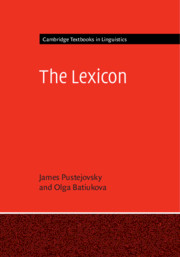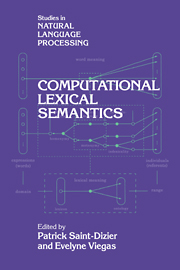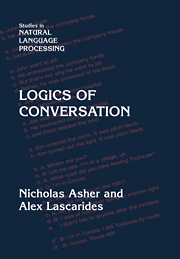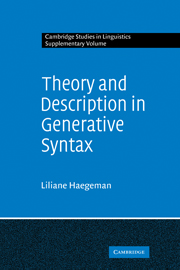Lexical Meaning in Context
This is a book about the meanings of words and how they can combine to form larger meaningful units, as well as how they can fail to combine when the amalgamation of a predicate and argument would produce what the philosopher Gilbert Ryle called a 'category mistake'. It argues for a theory in which words get assigned both an intension and a type. The book develops a rich system of types and investigates its philosophical and formal implications, for example the abandonment of the classic Church analysis of types that has been used by linguists since Montague. The author integrates fascinating and puzzling observations about lexical meaning into a compositional semantic framework. Adjustments in types are a feature of the compositional process and account for various phenomena including coercion and copredication. This book will be of interest to semanticists, philosophers, logicians and computer scientists alike.
- Proposes a new, formal framework for lexical semantics and predication
- Investigates the philosophical and formal implications of using a richly typed lexicon
- Integrates observations about lexical meaning into a compositional semantic framework
Reviews & endorsements
'Finally we have a representation of word meaning and how it interacts with more standard compositional semantics. The fundamental basis of Nicholas Asher's theory is that word meanings are lexically simple, but the combination of word meanings involves interesting and complex ways for the types associated with the words to interact. Formal semanticists and computational semanticists now have a theory that is well-enough developed that they can pursue solutions to a broad range of hitherto recalcitrant phenomena.' Francis Jeffry Pelletier, Simon Fraser University and University of Alberta
'Asher provides a beautifully clear critique of existing approaches to semantic mismatches in predication and offers the most comprehensive formal proposal to date for integrating the lexical, compositional, and contextual components of meaning.' Louise McNally, Universitat Pompeu Fabra
'This book is one of the most significant contributions in lexical and discourse semantics to emerge in recent years. It will inspire and challenge researchers to view, more systematically, the idea that lexical meaning is intimately dependent on the context within with words are used, in fact, strengthening the underlying premise behind a creative, generative view of lexical meaning.' James Pustejovsky, Brandeis University
Product details
March 2011Hardback
9781107005396
346 pages
229 × 152 × 21 mm
0.63kg
11 b/w illus.
Available
Table of Contents
- Preface
- Part I. Foundations:
- 1. Lexical meaning and predication
- 2. Types and lexical meaning
- 3. Previous theories of prediction
- Part II. Theory:
- 4. Type composition logic
- 5. The complex type
- 6. Type presuppositions in TCL
- Part III. Development:
- 7. Restricted predication
- 8. Rethinking coercion
- 9. Other coercions
- 10. Syntax and type transformations
- 11. Modification, coercion and loose talk
- 12. Generalizations and conclusions
- Part IV. Coda: References
- Index.







